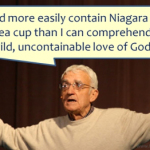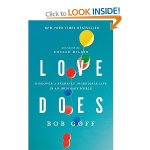“Often I have been asked, “Brennan, how is it possible that you became an alcoholic after you got saved?”
“It is possible because I got battered and bruised by loneliness and failure, because I got discouraged, uncertain, guilt-ridden, and took my eyes off Jesus. Because the Christ-encounter did not transfigure me into an angel.
There is a myth flourishing in the church today that has caused incalculable harm—once converted, fully converted. In other words, once I accept Jesus Christ as my Lord and Saviour, an irreversible, sinless future beckons. Discipleship will be an untarnished success story; life will be an unbroken spiral towards holiness. Tell that to poor Peter who, after three times professing his love for Jesus on the beach, and after receiving the fullness of the Spirit at Pentecost, was still jealous of Paul’s apostolic success.”











 Well, thanks to walking was able to fit into some cords and jeans just when I was about to give them away. Tidied two dressers and one tallboy. Gave away some books, and gave or threw away 3 pairs of sweats and trousers!
Well, thanks to walking was able to fit into some cords and jeans just when I was about to give them away. Tidied two dressers and one tallboy. Gave away some books, and gave or threw away 3 pairs of sweats and trousers!







































